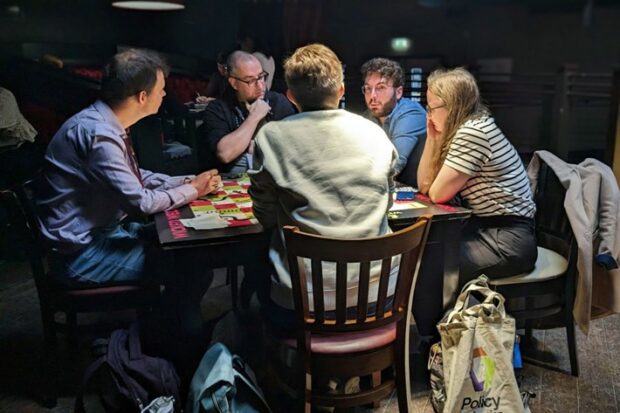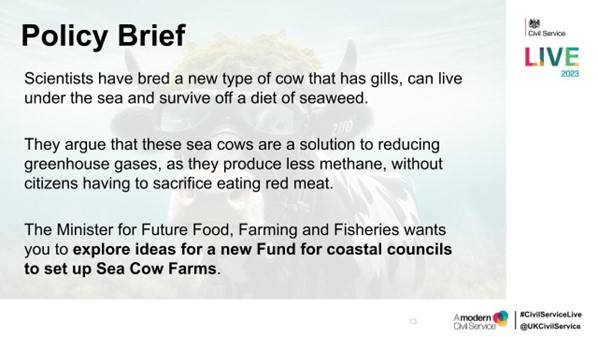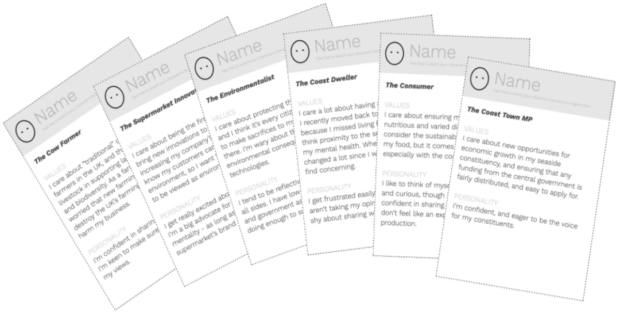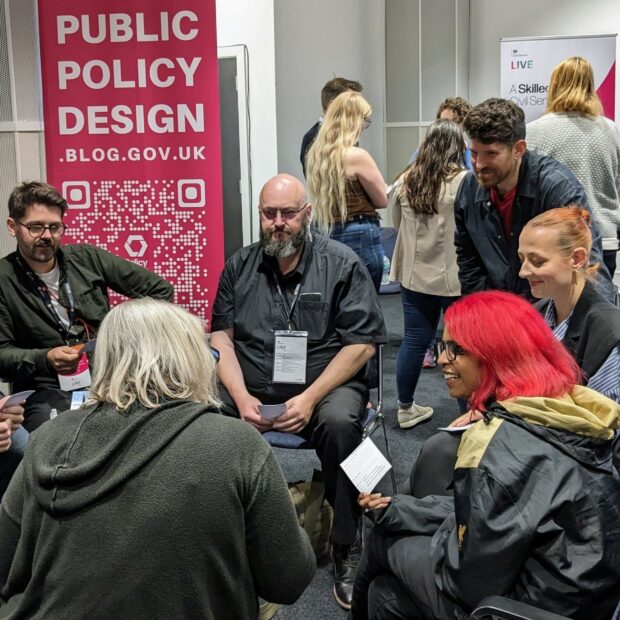
Would you rather edit a huge document and sit in loads of meetings, or take on a fictional character and play a cooperative game to explore a policy problem?
“It’s 2023 and scientists have bred a new type of cow that has gills and can survive underwater!”
When the opportunity to deliver a session at the Civil Service Live conferences aligned with a key objective for our year - to create a cross departmental training offer for co-design - we thought this was too good to miss.
The Policy Design Community brings emerging and innovative ways of working into how governments make public policy and services. One of the latest approaches for inclusive policymaking is co-design. Co-design is about designing policy collectively with the people who have lived experience of it and will be directly affected by change.
Our team for this project came from the Department for Environment, Food & Rural Affairs (Defra), Policy Lab, the Department for Education, the Department for Levelling Up, Housing & Communities, and the Home Office, and are experienced co-design practitioners working as policy designers, user researchers, design researchers and co-design champions.
We have previously prototyped different approaches and the best way to learn about the nuances of co-design, is to do co-design.
We set out to create an immersive, playful co-design experience for Civil Service Live, and to bring that vision to life we collaborated with game designer Matteo Menapace.
Why games?
Design methods can support anyone to explore new ways to tackle challenges and frame problems, but these methods are often not prioritised or accessible to non-designers. Game design is one approach that the Policy Design Community is exploring as a means of introducing novel tools and methods (like serious games) to policymakers who are looking to take a user centred approach to policy-making.
Games have been around for millenia. We could say they are as old as human beings. We know that other animals play with each other, but games seem to be a uniquely human expression that give play a structure and a ritual.
Think of a game you played recently. If you then compare it to another medium, like a novel or a movie, it’s clear there are similarities: you can step into a different world, or see our world from a different perspective. But there is a key difference: when playing a game, you shape the story, instead of just consuming it. In other words, games give you agency, while other media don’t.

Rules are the core technology of every game. When playing games, rules define how you interact with other people, what you can and cannot do, how you win and how you lose. Rules give a new meaning to our actions. For example, the rules of Rock-Paper-Scissors give Rock its own special meaning and gesture. Rock beats Scissors, which beats Paper, which beats Rock.
And what are rules, if not policy?
When we play a video game, its rules are often opaque and enforced by a machine. When we play a board game instead, we have to learn and constantly negotiate its rules. This trains us to think critically about policy.
When we make games, we make policy. So if you’re a policymaker, you are already designing games, but you’re perhaps not using that name.
An immersive co-design experience
We worked together as a hybrid creative team to design a game that can be used as a collaborative tool to explore the concept of participatory policymaking with Civil Service colleagues.
Our approach has been to develop an immersive experience that allows participants to explore the policy problem and design space while taking into account multiple perspectives. It encourages players to consider how collaborating with communities and people impacted by policy can influence both the design and delivery of policy.
“Fantasy Farming” is a cooperative game that was played by Civil Service Live conference delegates to work through a policy problem using principles of co-design (developed by the Defra Co-design Team). By taking part they learned about the benefits of including citizens and communities as well as the challenges - like finding the ‘right’ people to include and how long it really takes to listen to each perspective (up to 3 times as long as ‘traditional’ policymaking).
This face-to-face activity takes participants through a fictional policy problem on tackling climate change, specifically in a speculative farming policy context. Participants take on the role of community stakeholders and policymakers and play through a series of challenges to establish an agreed approach for the policy. Through listening, cooperation and collaboration in small groups the aim is that players can develop an understanding of the elements and conditions required for co-designing policy.

Participants are introduced to the principles of co-design to get an understanding of both the challenges and benefits of co-design and an opportunity to reflect on the practicalities of including citizens and communities in the process of designing public policies and services. The game uses elements of narrative and role play, and invites the groups to first build a community, then listen to the community and finally explore the possibility of coming to a consensus to design a policy that takes into account the needs and perspectives of the community.

Creating memorable and transferable skills
Clearly 45-minutes is not enough time for true collaboration, however Civil Service Live attendees had an opportunity to practically get involved and then reflect on the process of building, listening and designing together. We met hundreds of people over the course of the 6-week period by bringing Fantasy Farming to different venues across the UK including Glasgow, Newcastle, Manchester, Cardiff and London.

We asked the room ‘How could you apply what you have learned from the games session to your own work area?’
Responses ranged from “Out-of-the-box thinking!” to “Hard to say in my current role, but I really enjoyed the session” and “Think more about other perspectives when having meetings”.
Further themes from the feedback include applications of gaming in individual professional roles, considering how and when to include multiple perspectives, using creative approaches to policy challenges, positive feedback from attending the session as ‘something new’, reflecting on personal professional practice, interest in joining and learning more about the Policy Design Community.
If you would like to hear more about games in policy, co-design or to take part in future iterations of Fantasy Farming please contact policy.design@policyprofession.gov.uk.
Read more What does design do for policymakers? and Making spaces for experimental methods in policymaking and How games can help you take better decisions
Join our community
We use this blog to talk about the work of the multidisciplinary policy design community. We share stories about our work, the thinking behind it and what policymaking might look like in the future. If you would like to read more, then please subscribe to this blog. If you work for the UK's government, then you can you join the policy design community. If you don't work for the UK government, then join our AHRC Design and Policy Network.